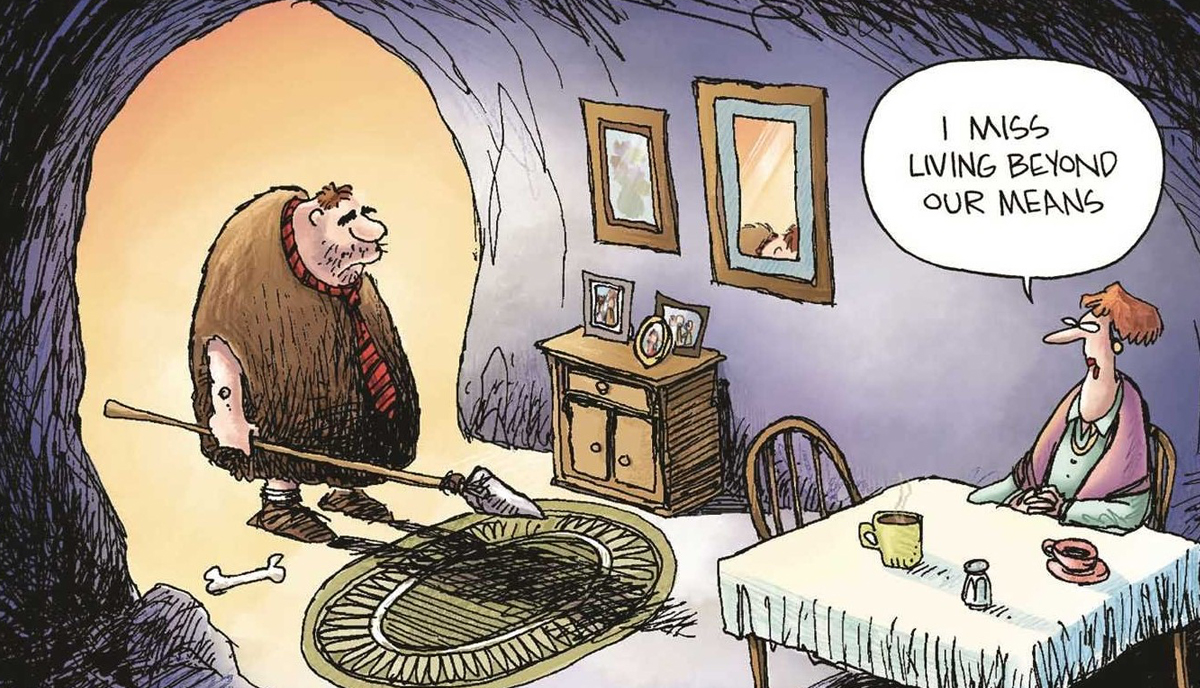Americans have a big financial problem according to a recent government study. In one of the most prosperous nations on earth: 40% of us can’t afford a $400 unexpected expense, 20% can’t pay all the bills in full this month, a quarter skipped seeing a physician due to lack of funds, and 25% have nothing saved for retirement.
For physicians, since we make a decent salary, all of these issues we face are usually self-imposed. That’s good news, because that means we can fix the problem ourselves, since the problem almost always stems from overspending.
The paycheck to paycheck (P2P) lifestyle is not easy to break. Spending more than we make is easy to do, and once we get used to the lifestyle, we don’t want to go through the pain of change. After all, we only buy the stuff that we want or need, right?
Breaking the pattern of spending all or more than we earn is not a complicated problem, but it will take effort to combat its effects. You will not be able to solve a problem using the same thinking that led you into the problem. Following is a 10 step process to get out of the P2P lifestyle for good.
1: Wake Up to the Problem.
Most of us are smart enough to solve problems we want to solve. The key is to notice that there is a problem and desire to change. If there is not enough in your retirement account to live the life you want, now is the time to make some changes so your future will turn out differently. If paying the bills each month is a struggle, are you ready to make the changes needed to end the struggle? Are you ready to do what it takes to stop the frequent bickering over money issues in your household?
Until you acknowledge the problem, there will never be enough motivation to fix your money problems. Debt may currently be a part of your life, but it doesn’t have to be. Make improving your financial situation your New Year’s Resolution: 2020 is the year we break out of the P2P lifestyle.
2: Stop Borrowing Money
Debt is probably the single biggest contributor to the P2P problem. Almost always, it stems from greed and a lack of patience. You want something you can’t afford so you just borrow the money in order to get it now. This increases monthly expenses. Many people blame their debt problems on student loans. If that is the case, why do they have a car loan, a boat loan, a credit card balance, and still owe money on the last vacation. These debts are not the fault of your student loans.
Only purchase items that you are able to buy with cash. If your credit cards have a balance, and you are paying interest every month, then cut them up and stop the madness.
3: Begin Tracking Your Expenses for 60 days
The biggest factor in getting out of the P2P life is to know exactly what you are doing with your dollars. Most people really don’t know where their money goes. They just don’t seem to have enough. The exercise of tracking every penny you spend for 60 days will be an eye opener.
Now you will know exactly what those drive through stops in the morning add up to each month. Seeing the grand total of how much eating out for lunch every day is eating away your finances might surprise you. Many times, this exercise alone will prompt a major change in your financial future. You will often see spending patterns that are not congruent with your financial goals.
4: Establish a New Spending Plan
Now that you see what it is you are spending every month, you can make some changes. Do you have goals in life that were not represented in the current way you are spending? Then incorporate them into your new spending plan. But in order to do so, you will need to remove some things that are not helping your financial future or not giving you the return you want.
If you want to break the P2P life, you should not kid yourself into being able to do it without a new spending plan. Very few people love creating and sticking to a spending plan. Most people see them as a restricting event, something to stop them from doing what they want with their money.
That is the wrong approach. A spending plan is freeing, allowing you to get that which you really desire in life. If you want a new life, you need a new plan to get there.
5: Make Life Changing Cuts
Don’t kid yourself into thinking you will be able to make a new financial life without making some significant changes. The reason you are in this situation is because the life you have been leading is above your paygrade.
You will need to make a significant change in the biggest expenses in your spending plan if you want big results. Housing, automobile, food, and vacationing may all need to be cut back.
One cut that no one likes but is often necessary to balance a spending plan is downsizing your home. Many doctors I council resist this change. They live in their dream home and have grown accustomed to the house. They want to continue living in their house, without making mortgage payments. When they finally relent and move to a less expensive living situation, the breathing room that creates in their spending plan is like a breath of fresh air. Changing houses is a very hard step to take, but after the move is completed and the weight lifted from your shoulders, the new plan usually feels better than the old house did.
6: Put $1,000 in the Bank
It’s important to have money in a savings account for unexpected expenditures. Each paycheck, start depositing a small amount into your savings account. Eventually you will have a balance of $1,000. This will keep you from reaching for your credit card and racking up some more debt when some unexpected thing happens. If it takes more than $1,000 to feel comfortable, then raise this balance to what you desire.
7: Make a Plan to Eliminate Your Debts
Almost everyone living P2P would be just fine if their debt payments were gone. In fact, they would be way better than fine. Look at your own finances and imagine you don’t have any debt. How would your life be difference with no credit card payment, no student loan payment, no car payment, and no house payment?
Most people would feel like they were swimming in money without any debt payments. Yet many people convince themselves their debt is “good” debt, and they resist removing it from their lives.
I work hard to convince people there is no such thing as “good” debt. All debt creates a burden. Ridding oneself of the debt burden takes a great weight off your shoulders. I’ve lived with debt and without debt, and I can tell you firsthand that without debt is better, much better. Most people who tell you about “good” debt have never lived with no debt. They are just rationalizing their own debt by telling you to keep yours.
I wrote an entire book on the benefits of Eliminating Debt. My life was much better after I eliminated my $500,000+ debt. You can do it also.
8: Automate Your Savings
Once you restructure your spending plan, you will have extra money that can go toward your future. If you want to get ahead financially, then you must start saving money. The only way you can save money is to spend less than you make. If you spend it all, there is nothing left to save.
If you automate your savings, you will not have the money pass through your hands to possibly spend. It will be out of sight and out of mind and growing into a great nest egg for your retirement.
Start maximizing your work retirement plan. Put everything into it you can. Do not postpone this step unless you are drowning in debt. If that is the case, then don’t put anything into savings until you have paid down enough debt to no longer be drowning. Swimming is tolerable, drowning is not.
Don’t try to save the left overs every month. There will never be left overs to save. Save first and spend the left overs.
9: Think Net Worth, Not Income
People who get ahead financially track their net worth and not their salary. Many doctors I council have a net worth that is in the negative by hundreds of thousands of dollars, yet they spend money like they are millionaires. They are actually HENRYs: High Earner, Not Rich Yet.
If you see a negative net worth, you will be motivated to improve it. If you see a high income, you are motivated to spend it. I track my net worth on a quarterly basis and want to see it steadily growing. Most who do not watch their net worth will find it is either shrinking or level. Growing should be your goal. When you reach retirement age, a nice nest egg to provide for you the rest of your life is only possible if your net worth is growing.
10: Don’t try to Keep Up With the Joneses, They are Broke
Finally, stop trying to show off, or live like someone else. Most of the people you think are doing well financially are not nearly as well off as you perceive. They are often struggling just like you. Maybe if you get your finances under control, the Joneses will want to keep up with you. Debt free is becoming a new status symbol.
Make 2020 the year you turn your financial life around. You can do it. One thing I learned from walking the 450 miles of the Camino, is if you will just keep walking in the right direction, you will eventually get there.





